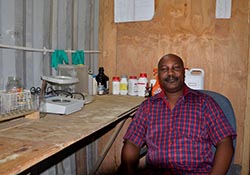New agricultural technologies help to innovate and modernize agricultural production in the light of climate change and soil degradation. Research has confirmed that the addition of inoculant to soyabean can boost yields with at least 40 % to 50 % with all other factors kept equal. Another benefit of inoculation is that it stimulates a high grain protein content (up to 40%). This is a great story for Africa with many of its countries depending on agriculture. The effect of inoculants on soyabean yields is the magical story that every farmer would like to hear.
One of N2Africa’s targets is to develop improved inoculant products and cost-effective production and delivery methods. A large challenge is to ensure availability as well as affordability. Previously, in Malawi, the Government Department of Agricultural Research Services (DARS) was producing inoculant sachets named ‘Soy’, accessible to a limited number of farmers who would come to the research station to purchase. Inoculants were also often imported from Kenya or even from as far as Brazil. The director of IITA Southern Africa, Dr. David Chikoye, has good news for the region: “We can no longer import inoculant from far, as inoculant can now be accessible within the region”.

production lab N2Africa lobbied for the private sector and agro-dealers as partners, to map a way of producing affordable inoculant in Malawi. Mr. Fredrick Kawalewale, the managing director of Agro-Input Suppliers Limited (AISL), took up the challenge to scale up the production of inoculants and he invested in lab equipment. In pilot year 2014 in Malawi, AISL already produced ten times as many inoculant sachets as DARS. Mr. Kawalewale remarked: “When we came, we improved the packaging, handling and we invested in the cold chain, in solar driven coolers for proper storage of Nitrofix inoculant. From 20,000 sachets of 50 grams, now we have moved to 280,000 sachets meaning we have managed to reach over 95,000 farmers. This all has happened within a space of three years. We are envisaging that we should reach 1,000,000 sachets which will translate to about 350,000 farmers”. To produce the inoculant, Mr. Kawalewale set up a very good high standard laboratory that ensures quality, excellent packaging, testing and good delivery to farmers. He is currently constructing bigger facilities with robust laboratory equipment to increase production of inoculant which would cater for the whole of southern Africa and later conquer the world. AISL is also coming up with inoculants for beans and groundnuts. All these products are aimed at ensuring that farmers like Natalia Matiasi have something to smile about when it is harvesting time: 
soyabean farmer, Natalia Matiasi showing her harvest for 2016/17 season Ms. Matiasi is a soyabean lead farmer in her community. She applied inoculant to her soyabean seed before planting and she planted in double rows to increase yields. Ms. Matiasi observed that the application of inoculant on improved soyabean varieties led to greener leaves, longer stems and a larger number of pods compared to soyabeans without inoculant. The inoculated roots had a lot of nodules, meaning that they were highly able to return nitrogen to the soil. She also compared her harvest of maize in the following year and observed that maize yields had increased with less application of inorganic fertilizer on the field where there had been inoculated soyabean. Ms. Matiasi explained: “This time, access to inoculant was easier than other years. We accessed it from our local agro-dealer at a price of MK1000.00 (US$1.4) and applied it to at least 2 ha of land, which proves how economical planting soyabean is compared to my previous tobacco farming. I am now able to send my children to school from soyabean farming”. Just like every visionary farmer, Ms. Matiasi hopes she will be able to send her children to high school and college from the farming of soyabean. She also plans to renovate her house and buy land. She said that over 400 farmers visited her field in the last planting season to appreciate her farming practices. Some of them have already started planting inoculated soyabean and are under her supervision. N2Africa is supporting her with information about soyabean and legume farming and marketing strategies. |
The coordinator of N2Africa in Malawi, Mr. Lloyd Phiphira, is proud to see that N2Africa’s vision is materializing and thinks Malawi is a model of impact that has been achieved with partnership with private sector and government. He comments: “N2Africa is proud of what AISL has achieved. Many of our targets have been met mainly through partnerships. We have seen the lives of farmers improving and this was our goal. We are also happy to see the private sector blossoming and ready to sustain that which we dreamed of from phase one of the project.”
Emmanuel Mwale. Pictures: Emmanuel Mwale, ICT Officer, IITA Malawi
